- Home
- Barbara Metzger
Miss Westlake's Windfall Page 9
Miss Westlake's Windfall Read online
Page 9
“N-no, m-ma’am. Th-that can’t be smuggling m-money b-because we d-don’t have any smugglers.” The lieutenant’s face was red and his fingers trembled as he shoved the pouch back across his desk toward Ada.
“We don’t?” She could not help glancing out the window where Tess and Leo were sitting on a bench waiting for her, discussing the setting for the next chapter’s illustrations. At least Tess was conversing; Leo was listening. Lieutenant Nye followed her gaze and waved to Leo. The riding officer waved to Leo?
“Oh, uh, M-Mr. Tobin? Sh-shipper, d-don’t you know. In trade.”
At her look of disbelief, Quintin tugged at his too-tight shirt collar. “G-great p-patriot, Mr. Tobin.”
The young man’s brainbox had to be as empty as Ada’s bank account. Still, she was not about to tell the lieutenant what the entire neighborhood knew, not when Leo had just fetched Tess a sack of peppermints from the apothecary, her favorites.
Lieutenant Nye had been given permission to tell Ada the truth, since Chas knew she’d never let the matter rest, and poor Quintin was not up to her weight. “N-no one’s supposed to know, b-but seeing as how M-Miss Westlake is h-holding his hand, I can tell you that M-Mr. Tobin is a regular hero, using his ships to gather information to d-defeat Napoleon.”
That was why, the young officer went on to explain, losing his stammer in his enthusiasm, he could not take her found money to headquarters as illegal profits from the smuggling trade. If there was a profit, then there were smugglers, and if there were smugglers, he’d ought to be capturing them. If he didn’t arrest anyone, he said with another glance out the window to where Leo now had his arm around Tess, looking over her shoulder at a drawing in her lap, he’d lose his post. But if he did arrest anyone—Leo was nibbling on Tess’s ear!—then Lord Ashmead would have his hide, to say nothing of his horse and his cottage.
“Th-therefore, m-ma’am, there are no smugglers. You m-might as well keep the m-money.”
Chas had left one final directive with his young subaltern: Do not, under pain of dismissal, dismemberment, and/or decapitation, propose marriage to Miss Ada. But there she was, the pretty little lady, looking adorably confused, holding a heavy sack of the ready and rhino.
So he asked if she’d save him a dance at Lady Ashmead’s ball. The viscount couldn’t call him out over one country dance, could he?
Chapter Twelve
“Did you know, Tess, about Mr. Tobin?”
They were waiting for Leo to return from the livery where he’d left his carriage. Ada was happy she had her fur muff to ward off the day’s chill. Of course she had the confounded coins in there too, but that was not her immediate concern. “Did you know all along he was not a criminal?”
“A criminal? My Sebastian? How could he be? One look into those wide eyes shows you what a gentle man he is. The eyes are the window to the soul, you know, and Sebastian’s soul is noble, unblemished by base greed and ambition.” Her voice rang out with passion; a delivery boy stopped to stare. “He is brave and true, with boundless courage to fight the forces of evil. He is wise and considerate of those in his care, a perfect crusader, the flower of chivalry, true to his cause.”
“I thought Sebastian was a pirate.”
“A pirate with exemplary character, the essence of nobility, the very embodiment of manly virtue.”
“Yes, dear, I am sure Sebastian is all of those things, but I was speaking of Mr. Tobin.”
“So was I.”
“Then you knew he was helping Lord Ashmead gather intelligence for the War Office?”
“Of course. He told me. Not that I did not recognize his intrinsic goodness and strength of purpose on my own, mind. Don’t tell me you suspected Leo of nefarious doings? Ada, Ada, how can you be so blind?”
“Blind? I’d have to be deaf and dumb, besides, to miss all the rumors, all his trappings of wealth.”
“Ah, but you see only with your eyes, hear only with your ears. Where is your instinct, your intuitive recognition of true worth? Am I the only one In the family to transcend the experiential boundaries, to grasp a person’s aura?”
Tess might be the only person in the world, for all Ada knew. Leo pulled up with the carriage and Ada saw an expensively dressed ... smuggler.
Her sister tsk-ed as she stepped into the coach. “Ada, you have to start letting your heart guide you, not your head. That’s the only way to find true happiness.”
So after luncheon, when Tess and Leo went off to visit his ship, Ada let her heart guide her—straight to the Meadows.
* * * *
There was nothing odd about Ada’s calling on the viscountess, since she often stopped in to pay her respects, admire the current needlework project, help sort yarns, and listen to her ladyship rant about undutiful children. She had wondered if Chas’s mother might be furious at her over her latest and last refusal to wed the woman’s son, but Lady Ashmead was too excited about planning her gathering—and her son’s betrothal to some female more deserving of the Ashmead name—to resent Ada.
Lady Ashmead, in fact, was delighted to see her young neighbor, immediately putting Ada to work addressing invitations to the masquerade ball. Tess would be in alt at the chance to wear a costume, Ada knew, especially since Mr. Leo Tobin’s name was one of those on the list to be inscribed.
While Ada worked, Lady Ashmead continued on with her sewing. She was embroidering the Ashmead coat of arms on a gold tunic, for she intended her son to be dressed as a knight for the masquerade. A fine disguise, Ada agreed. No one would know who he was.
“Mind your sauce, girl. Ashmead will be dignified, as befits his position. You, I suppose, will dress as a Gypsy.” Her wrinkled nose seemed to suggest that Ada’s everyday appearance was not much better.
Since a Gypsy was exactly what Ada had been thinking of when she heard about the masked ball, she bit her lip, which was usually the best strategy for dealing with Chas’s mother.
Satisfied she had both quelled any insolence and delivered a snub, Lady Ashmead cheerfully went on to describe the house party, and how much work it entailed. Ada had seen all of the servants scurrying back and forth with rags and mops, buckets and brooms. She had no doubt they were indeed working hard.
Most of the guests would only be coming to the Meadows for the weekend of the ball, still a fortnight away, but a few would arrive within days.
“And you cannot believe the effort it is all taking,” Lady Ashmead said from her comfortable chair near the window while Ada sharpened yet another quill and stretched her cramped fingers. “But I am not complaining, mind. It is a mother’s duty, after all, to do what she must to see to her children’s welfare, yes, even at the cost of her own health. A son’s happiness comes first.”
Ada didn’t think Chas was happy about having his house full of idle party-goers, but she knew better than to contradict his mother, who was already going on: “Not that you would understand, missy, not being a mother. At the rate you are going, you might never be one. Your poor mother must be grieving in her grave. One son dead with no heirs, one son endangering the whole line by playing soldier, one daughter with more hair than wit, and the other one turning down—But no more on that score. I know when to hold my tongue.”
Lady Ashmead held her tongue for as long as it took to lick a new strand of floss before threading it through the needle. Then she went on about the travails she suffered, the loneliness of having her ungrateful daughters move away, her disloyal son and lazy servants. The price of corn and the Prince’s profligacy were in there someplace too, but Ada had stopped listening.
At last, done writing out the addresses, Ada made her escape. On her way out, she casually asked the butler, whom she’d known nearly as long as her own servants, if the master was in his office. The butler just as casually winked and nodded.
Chas was in his office, all right, sniffling and coughing from last night’s wet ride to find Quintin Nye, who took his job of not finding smugglers seriously indeed. As usual these days, Cha
s was thinking of Ada instead of adding his columns of figures. He was wondering what excuse he could give for calling on his neighbors three days in a row, without ruining Ada’s reputation. A pox on pawky proprieties!
He even had the unworthy thought, undoubtedly due to his stuffy head scattering his wits, that if Ada’s virtue was compromised by his actions, she had no other choice but to marry him. It could work ...
No, ruining Ada was as reprehensible as Leo’s suggestion of running off with her to Gretna. Besides, she would never forgive him for forcing her hand. Then, too, he had no guarantee that his persnickety, perplexing peahen would not choose to stay ruined, rather than wed against her will.
He sighed and blew his nose. This courtship business was as bad as the ague.
Tally barked in agreement. No, the dog barked because Ada was coming into the room unannounced, as if his lordship’s wistfulness had conjured her out of the air. Chas stood behind his desk as she approached. She sidestepped the dog, as usual, with a brief, insincere “Good doggie,” and came close enough to pound her fist on the cherrywood surface. He sat down. No figment of a fevered brain, this, just Ada in her attitudes. He sighed again.
“Why didn’t you tell me Leo was not a smuggler?”
“Good day to you too, my dear. May I say you look a treat with roses in your cheeks?” She did, too, and he loved the way her eyes flashed with spirit and her curls tumbled around her ears.
“Hello, Chas. You look terrible, even worse than yesterday, if possible. What happened?”
“Just the sniffles. You were saying?”
“Oh, yes. I was wondering why you never told me that Leo, who you never told me was your half-brother, either, was not a smuggler. I feel the veriest fool.”
“But he is.” Chas poured them each a glass of wine from the decanter on the corner of the desk. “I swear to you that the bottle this came from bore no customs stamps.”
“He is more than a smuggler, though, isn’t he?” She sat opposite the desk and sipped at the wine.
“A great deal more. Basically, now that his face is too well known in France for him to be safe there, he runs a network of spies and intelligence-gatherers. His sources have been amazingly accurate, and incredibly helpful to the war effort. He also makes sure that the information that flows in the other direction is vague or incorrect.”
“And you?”
“I help finance the venture. The War Office would not let me take part, for if I were captured there’d be hell to pay, to say nothing of an exorbitant ransom. They let me coordinate the operation at this end, playing courier and such, but mostly I get to pay the informants.”
“Then Leo really is some kind of hero, and not just in Tess’s imagination?”
“As soon as the war is over, his name will be cleared. Till then, though, make no mistake, he is a smuggler, and makes a tidy profit by the trade, too. So do the local men, some of whose families would be going hungry now, due to the blockade. I know the thought of putting money in French coffers rankles—I have friends in the Army, too—but there seemed no other way of ending the war more quickly.”
“Then the money I found really wasn’t left by the free traders?”
“I—” He blew his nose again in one of his myriad monogrammed handkerchiefs. “I assure you, no self-respecting smuggler would leave a treasure trove in a tree. Devil take it, Ada, why don’t you just spend the cursed money already and be done with it? You are driving me—That is, you are driving yourself to distraction over a trifle.”
She swirled the wine in its priceless crystal glass. “Only Golden Ball would call a small fortune like that a trifle.”
“Then it can pay some of your immediate debts and leave enough to buy something pretty for yourself.”
“Why?”
Why? Because Chas couldn’t buy it for her, not under the rules of polite society. “Because you deserve it, working so hard for everyone else. How long has it been since you had a new gown, one you did not have to stitch up yourself?”
Ada looked down at her perfectly serviceable dark blue dress. Now he was criticizing her clothes, too? “Oh?”
“Lud, there is nothing wrong with your frock.” Nothing except she’d appear the dowd next to the London Diamonds his mother was inviting. Chas couldn’t have cared less. In fact, he’d give his good right arm to see Ada in less, a whole lot less, but he knew she would be conscious of the disparity between her wardrobe and that of his house guests. “I just thought you might like something new.”
Of course she would. What woman wouldn’t? Ada would adore a gown made from something in one of Jane’s fashion magazines, pink, with three rows of flounces. Unfortunately, Ada could not afford a feather for her hair, much less a flounce. With invitations to the Meadows, the Westlakes ought to reciprocate with some kind of entertainment for Lady Ashmead’s guests, besides, if Ada could find the funds—in her own accounts, not in someone else’s sack. If someone, someone she would not name, thought perhaps she would accept his charity, he could think again.
“I cannot, Chas,” she told him. “It wouldn’t feel right, and Tess says we should let our feelings lead the way.”
“You are taking advice from your sister? The sister who ruined her London Season by singing an aria at the opera, from Princess Esterhazy’s box?”
* * * *
Chas insisted on riding beside Ada’s pony cart on her way home, despite his running nose and watering eyes, and despite his mother’s frowns, using the early autumn darkness as an excuse. Ada insisted he come inside for some hot tea before the return trip.
Jane sweetly apologized—to the viscount, not Ada—for having taken over the parlor for her dressmaking, since the light was better than in her bedroom. She had every table and chair covered, taking the lace from this gown and the ribbons from that one, to make one elegant, au courant evening gown. Jane was going to make an impression on Lady Ashmead’s gentleman guests if it killed her. Living the rest of her life as a poor widow certainly would, otherwise.
When Ada informed her that the ball was to be a masquerade, Jane would have had a fainting spell, except there was no available surface except the floor. She shrieked instead. Chas winced.
“No, I shall wear this gown, with this bodice, and this over-skirt and this trim, by thunder. I absolutely refuse to wear some insipid shepherdess costume.”
Since that was Ada’s second choice of outfit for the masked ball, she winced.
“I shall wear a domino over my gown, that’s what I’ll do. Ladies and gentlemen both wear them all the time when they don’t wish to act like some foolish characters in a play. Isn’t that right, Ashmead?”
He nodded, but Ada asked, “Do you have a domino, Jane?” She’d never seen her sister-in-law with one.
“No, we’ll simply have to purchase one. Blue, I think, to match my eyes.”
“I’m sorry, Jane,” Ada said, with an embarrassed glance toward Chas, “but you know we cannot afford the expense right now.”
Jane got ready to scream the house down, but her eyes narrowed instead, focusing on the suspiciously lumpy fur muff Ada hadn’t found a place to set down. “What about that money you found that you’ve been hoarding? I insist on my fair share of it!”
“Oh, this?” Ada clutched the muff more firmly to her chest. “I am bringing it to the magistrate tomorrow.”
Viscount Ashmead groaned.
“You had a better idea?” she asked sweetly.
“I... I...”
“You really ought to be home in bed with a hot posset, Chas.”
* * * *
“Come on, Tally, old girl. It’s going to be another long night.”
Chapter Thirteen
Ada passed another sleepless night. Strange, she thought, how one night she could not fall asleep because Chas had kissed her. The next night she could not, because he had not. She supposed his lack of a farewell kiss could be ascribed to congestion, or abiding by convention. Or the conviction that Ada’s kisses were un
satisfactory.
What if he had not been affected by that storm of emotion she felt when their lips met, when his arms went around her, when he pressed her against his hard chest? Had he kissed her once to make sure they wouldn’t suit and the second time to be certain? What if, as Jane kept hinting, Chas was harboring dishonorable intentions toward her, now that his honorable offer had been summarily rejected? Were such kisses the stepping stones along the primrose path, and he’d reconsidered? Worst, had Chas lost interest in her now that his mother was dangling society’s darlings in front of him?
No, Ada would not dwell on such depressing thoughts.
She brightened. What if he were truly ill? Why, then she’d have an excuse to go visit him later, after her errands were completed.
She hurried through her morning toilette, donning her oldest dress and gulping her morning chocolate and a sweet roll, before meeting Tess in the attics. They were going to see what they could find in their mother’s old trunks that might be usable for costumes. Tess was determined to appear as the sea goddess from her drama, to whet the guests’ appetite for the forthcoming publication. Advance publicity, she explained to Ada. If the house party was interested, perhaps Lady Ashmead would consider having a reading from the book as well.
Tess had not yet convinced Leo to dress as Sebastian, the pirate, for he wished to appear before Lady Ashmead in his finest evening ensemble, not half-naked with a gold hoop in his ear and a curved sword at his side. The question was not whether Tess could talk him into the pirate’s costume; it was whether she could locate a stuffed parrot to sit on his shoulder.
Ada absolutely refused to be the evil kraken, dragging its serpent’s tail through the quadrille.
“What about the princess, then? Sebastian saves her from the monster, and is rewarded by her father the king. Of course he loves the sea goddess, and I have not decided what happens to Princess Pretty, but I am sure she finds True Love and a happy ending.”

 My Lady Innkeeper
My Lady Innkeeper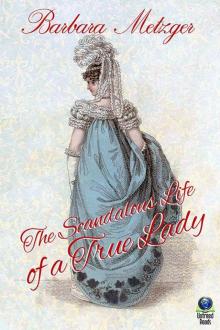 The Scandalous Life of a True Lady
The Scandalous Life of a True Lady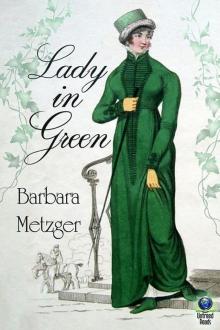 Lady in Green
Lady in Green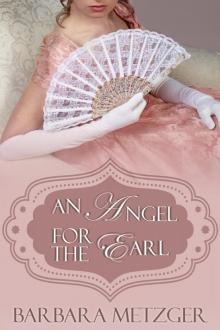 An Angel for the Earl
An Angel for the Earl Truly Yours
Truly Yours Bething's Folly
Bething's Folly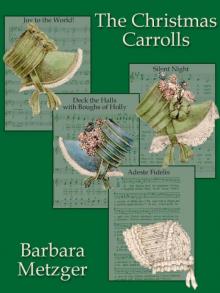 The Christmas Carrolls
The Christmas Carrolls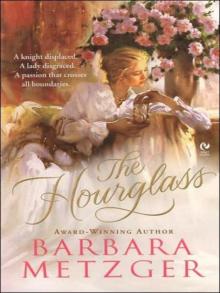 The Hourglass
The Hourglass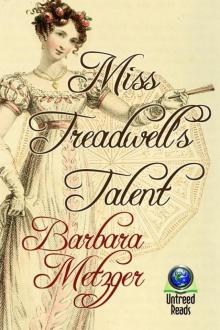 Miss Treadwell's Talent
Miss Treadwell's Talent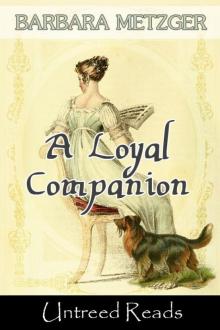 A Loyal Companion
A Loyal Companion Love, Louisa
Love, Louisa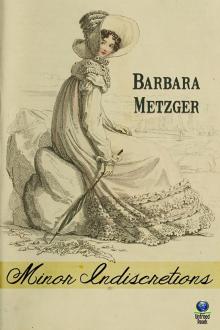 Minor Indiscretions
Minor Indiscretions Jack of Clubs
Jack of Clubs An Enchanted Christmas
An Enchanted Christmas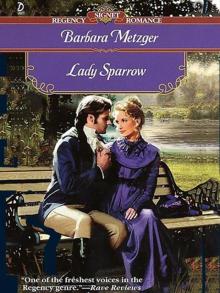 Lady Sparrow
Lady Sparrow Miss Westlake's Windfall
Miss Westlake's Windfall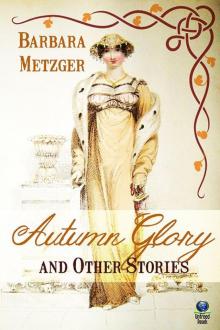 Autumn Glory and Other Stories
Autumn Glory and Other Stories Greetings of the Season and Other Stories
Greetings of the Season and Other Stories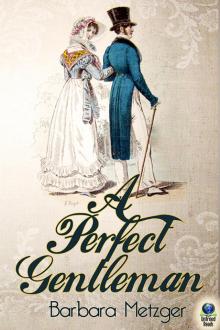 A Perfect Gentleman
A Perfect Gentleman